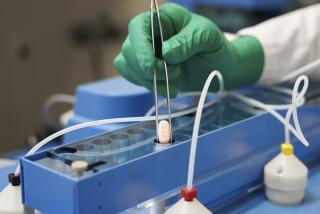Cardiac care not up to par
- Share via
Not only do many heart disease patients not get the best available treatment at their local hospitals, those who suffer a heart attack at night may be less likely to survive.
Heart attack patients often do not receive the most appropriate drugs for their conditions, and discharged patients typically do not receive adequate information, according to several studies reported last week at an Orlando meeting of the American Heart Assn.
“Acting quickly with therapies that have been shown to be effective can save lives,” said Dr. James Hoekstra of the Wake Forest University School of Medicine in Winston-Salem, N.C. “If we ... utilize all the proven therapies within the first 24 hours, our patients will do better.”
In a study of 56,000 patients arriving at 400 emergency rooms with heart attack symptoms, for example, Hoekstra and his associates found that two out of three did not receive a new class of clot-inhibiting drugs within the first 24 hours, despite large studies showing that the drugs prolong lives.
The drugs in question -- generically known as glycoprotein IIb/IIIa inhibitors -- are marketed under such brand names as ReoPro, Aggrastat and Integrilin. They block receptors on blood platelets, preventing them from clumping together into clots, and have been shown to be most effective when administered within 24 hours after symptoms begin.
Hoekstra reported that only 2.7% of those in his study who got the drugs within 24 hours died while in the hospital, compared to 4.7% of those who got them later. Patients who didn’t get the drugs immediately tended to be older, to have additional heart problems and to have more cardiovascular disease.
“This is one of the paradoxes that we see in medicine, that the patients who would benefit the most from an effective therapy are not receiving it,” said Dr. Eric Peterson of the Duke Clinical Research Institute in Durham, N.C., who participated in the study.
In a separate study, Dr. Gregg C. Fonarow and his colleagues at UCLA found that the 250 hospitals in the study routinely fell short of meeting normal standards of care for heart attack patients.
Nearly a third of 33,046 patients discharged from 250 hospitals after a heart attack, for example, were not given a family of drugs called ACE-inhibitors, which have proved to be lifesaving in such circumstances. Nearly one-fifth did not have their left ventricular function measured to determine their heart’s pumping ability.
About 72% of patients were also discharged without receiving a complete set of instructions about their medications; follow-up visits; a list of signs to look for, and actions to take, if they have problems; or information on a low-sodium diet and physical activity. And 69% of smokers did not receive counseling about quitting.
All those actions represent major quality-of-care indicators, and failure to meet them indicates a hospital is not providing the best treatment possible. “If hospitals improved their adherence to the guidelines, it would have a huge impact on the lives of heart failure patients,” Fonarow said.
Finally, hospitalized heart patients who suffer a cardiac arrest -- a sudden loss of heart function -- are 38% more likely to survive if the arrest occurs during the daytime, according to Dr. Mary Ann Peberdy of the Virginia Commonwealth University Health System.
Cardiac arrests, most often caused by an irregular beating of the heart, occur with equal frequency during the day and night.
Patients need a shock with a defibrillator to restore normal heart function, but they are apparently less likely to get it on a timely basis at night, when staffing levels are lower and the arrest is less likely to be witnessed or recorded on a heart monitor.
Peberdy studied reports of 17,991 cardiac arrests in 250 hospitals participating in a national registry.
She found that only 13% of patients survived if the episode occurred between 11 p.m. and 7 a.m., compared to an 18% survival rate for arrests occurring at other times.
She concluded that hospitals need to find new technological measures to alert staff when a patient suffers an arrest at night.






